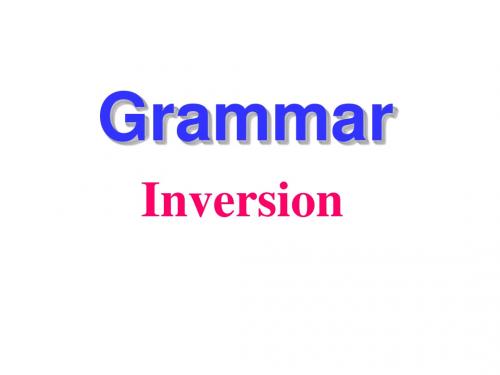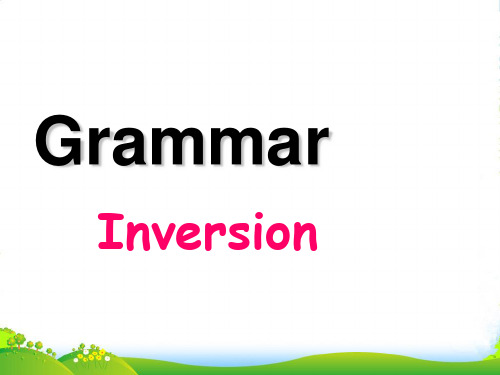【同步教学】新课标人教版英语必修4:课件Period 5 Grammar
【高一同步教程】高中英语必修4 Unit5语法:构词法讲解及练习

高中英语必修4 Unit 5语法教学案Section ⅢGrammar—构词法语法图解【探究发现】①chairman主席newspaper报纸hometown 家乡airport 机场sunrise 日出②dislike 不喜欢incorrect 不正确的unlucky 不走运的retell 复述telephone 电话③reader 读者inventor 发明家Chinese 中国人Indian 印度人artist 艺术家kindness 和蔼operation 手术④water 水/浇水dry 干的/弄干book 书籍/预订nurse 护士/护理better 更好/改善[我的发现](1) ①组中的单词是将两个单词合并在一起,形成一个新的单词。
这种构词法被称之为合成法。
(2) ②组中的单词都是在各自的词根前加了不同的前缀,如dis-,in-,un-,re-,tele-等。
(3) ③组中的单词是在各自的词根后加了不同的后缀,如-er, -or, -ese, -ian等。
(4) ②③组中单词的构词法被称之为派生法。
(5) ④组中的单词所展示的构词法被称之为转化法。
英语中词的构成方法主要有三种:合成、派生和转化。
一、合成由两个或更多的词合成一个词,有的用连字符“-”连接,有的直接写在一起,还有的由分开的两个词构成。
1.合成名词构成方式举例构成方式举例名词+名词weekend周末动词+名词postcard明信片名词+动词daybreak破晓动词-ing+名词waiting-room候车室名词+动词-ing handwriting书法形容词+名词fastfood 快餐构成方式举例构成方式举例名词+动词-ing English-speaking讲英语的形容词+名词part-time兼职的名词+动词-ed state-owned国有的形容词+动词-ing good-looking相貌好的副词+动词-ed widespread分布广的形容词+名词+-ed warm-hearted热心的构成方式举例构成方式举例形容词+名词sometimes有时副词+名词indoors在室内介词+名词alongside在一边副词+介词nearby附近4.构成方式举例代词宾格+self herself她自己himself他自己物主代词+self myself我自己yourself你自己形容词+名词anything任何东西somebody某个人5.合成动词构成方式举例名词+动词sunbathe晒太阳typewrite打字形容词+动词whitewash粉刷safeguard保卫副词+动词overthrow推翻upset使生气[名师点津](1) 合成词的复数形式通常是把前面的主体名词变复数。
人教版 新课标 必修四 第五单元 Unit 5 Grammar 构词法 非常实用的课件(共34张PPT)

19. bi-
bicycle
bilingual
20. tritricycle
triangle
21. multimultimedia
multitask
名词后缀
P3 8)employee interviewee
n.
–
P4 12)child neighbor
21) friend student leader scholar
derivation [‘derɪ’veɪʃn] 派生
12. over- 在…之上,过于
overhead
overcoat
overuse
overweight
overlook
13. under- 在…之下 , 不足 underground underwear undervalue underweight
compounding [ 'kɒmpaʊndɪŋ] (合成 )
a __g_o_o_d_-_l_o_o_k_in_g___ girl a girl that looks good a __h_a_r_d_-_w_o_r_k_in_g___ student a student who works hard _E_n_g_li_s_h_-_sp_e_a_k_i_n_gcountriescountries that speaks English __p_e_a_c_e_-l_o_v_in_g_ people people who loves peace
n. /adj.
free wise king
– n.
freedom wisdom kingdom
名词后缀
n.
– n.
book leaf pack
高中英语_Unit4_Grammar课件_新人教版必修5

3. Only in this way ____ do it well.
A. must we
C. can we
B. we could
D. we can B. arrived he D. did he arrive
4. Hardly ____ when it began to rain. A. had he arrived C. he had arrived
Many students are there in the classroom.
2. 用于“here (there, now, then) + 不及 物动词 + 主语的句型中, 或以out, in, up, down, away 等副词开头的句子里 面,表示强调。 Here comes the bus. There goes the bell. Now comes our turn. Out went the children.
划线的均是表示地点 状语的介词词组,并 且是位于句首。
4. 如果直接引语后注明引语是什么人所说的,
主语是名词时, 用倒装结构。主语是代词时, 一般不用倒装结构。 “ Let’ go,” said the man / he said.
部分倒装
1. 用于疑问句 Do you speak English? Will you attend the meeting? What would you like? What can I do ?
2. Not until all the fish died in the river
____ how serious the pollution was.
A. did the villagers realize
高中英语人教版必修四unit 5Grammar 课件

重点语法精析
• 2.In the good care of the nurses,the boy is
________ recovering from his heart operation.
• A.quietly
B.actually
• C.practically
D.gradually
• 答案 D
经历
重点语法精析
• 4.合成副词
构成方式 形容词+名词
形容词+副词 副词+副词 介词+名词 介词+副词
例词 hotfoot匆忙地 anyway无论如何 anywhere无论何处 anyhow无论如何 however尽管如此 overhead在头顶上 forever永远
重点语法精析
• 5.合成代词
合成 上的词合成为 blackboard,hardworking,
一个词
schoolmate,newlyborn
转化
由一词类转化为 另一词类
answer(n.v.),back(n.v.adj.adv.) ,head(n.v.)
派生
在词根上加前缀 或后缀
careful,carefully,careless, carelessness,carelessly
了吗? • He hammered a nail into the wall. • 他在墙上钉了一个钉子。 • 3.形容词转化为动词 • The train slowed down to half its speed. • 火车速度减慢了一半。 • The classroom gradually quieted down. • 教室里渐渐静了下来。
amusement park.It was ________ journey.
人教课标版高中英语必修四 Unit5 Grammar 教案-新版

Unit5 Grammar教学设计设计意图This period is the last part of this unit. The aim of it is to help students get a basic knowledge of grammar in this unit. The emphasis is mainly focused on the understanding and usage of word formation. Therefore, teachers should create relatively real context to present enough words for students to draw a conclusion about the rules of how to use word formation to extend both their active and passive vocabulary. Meanwhile, teachers should not spend too much time in explaining the grammar but offer more opportunities to students to practice this kind of grammar. The best way to learn grammar is to put it into practice. In addition, the exercises designed ought to be simple and easy, which fits the students’ cognitive rules and enhances their ability.教学重点Enable students to get familiar with how to use word formation to enlarge their vocabulary, and in the time to improve their reading ability.教学难点Get students to grasp the rules of using word formation correctly and help them put these rules into their daily study.教学目标1. Help students know about the rules of this grammar point.(1) Study three main kinds of word formation: compounding, conversion and derivation.(2) Deal with some exercises about word formation.2. Enable students to make use of word formation to extend their vocabulary.呈现新知Lead-inHello, everybody! Today we are going to learn a new kind of grammar: word formation. Since you words of the following sentences and talk about the meanings of them, meanwhile pay attention to the formation of them.1. There are _____ (不同的) kinds of theme parks, with a different park for almost _____ (一切).2. Some parks are famous for having the __________ (最大或最长的过山车).3. _____ (不论哪一个和不论什么) you like, there is a theme park for you.4. The theme park you are _____ (很有可能) most familiar with is Disneyland.5. If you want to _____ (体验) the ancient days and great deeds of English knight and ladies, princes and queens, then England’s Camelot Park is the place for you.6. Every area of the park is _____ (仿效,仿造) after life in the days of King Arthur and the knights of the Round Table.The teacher gives students several minutes to finish this exercise and lets students talk about the formation of these words. At the same time the teacher writes down model words on the blackboard.Suggested answers: 1. various, everything “Various” is a derivation of the word “vary”; “everything” is a compounding of the two words “every” and “thing”.2. the biggest or longest roller coasters “Biggest” and “longest” are both derivations; “roller coasters” is a compounding word.3. Whichever and whatever “Whichever and whatever” are both compounding words.4. probably “Probably” is a derivation of the word “probable”.5. experience “Experience” here can be looked as a conversion, and it is used as a verb.6. modeled “Model” is originally a noun but here it is a conversion and “be modeled after” is a set phrase.When students finish these exercises, make sure that they:(1) Have a concept of word formation.(2) Arouse the awareness of getting to know the rules of forming words.感受新知Well, from the six sentences above we can see, there are different kinds of ways to form words. But generally speaking, word formation mainly includes three kinds: compounding, derivation and conversion. You may find some difficulties inunderstanding how to grasp the rules of word formation. Don’t worry. We will learn their concept and rules one by one. The following three exercises will be of great help about how some words are formed, which will enlarge your vocabulary as well as improve your reading ability.1. Combine the words from the first two columns to make new words in the third column and discuss the characteristic of the word formation in Column 3.Column1 Column 2 Column 3police by (1) _____black ever (2) _____English looking (3) _____ordinary office (4) _____how board (5) _____cow boy (6) _____passer made (7) _____post stop (8) _____bus speaking (9) _____man woman (10) _____ The characteristic of the word formation: words in Column 3 are all _____ words.Suggested answers: (1) policewoman (2) blackboard (3) English-speaking (4) ordinary-looking (5) however (6) cowboy (7) passer-by (8) post office (9) bus stop (10) man-madeThe characteristic of the word formation in Column 3: words in Column 3 are all compounding words.2. Write out the missing words in their correct forms according to the requirements and observe the characteristic of the word formation.Suggested answers:3. Read the following sentences and find out the part of speech of the underlined words. Meanwhile translate them into Chinese.(1) Where there is a will, there is a way.You can do whatever you will do.The newly-built museum will be open to the public next year.(2)The use of too much fertilizer leads to serious problems.Nowadays people can use the computer to do a large quantity of things.(3)Experts present at the conference are from all over the world.She bought a special present for her mother’s birthday.(4)Weather permitting, we will go hiking tomorrow.Finally I managed to get my driving permit.Give students five minutes to finish this exercise and strengthen their sense of conversion.Suggested answers: (1)第一个“will”是一个名词,意为“意志,志气”;第二个“will”是一个情态动词,意为“愿意”;第三个“will”是助动词,表示“将来”。
新课标人教版英语必修4:Unit 5 Theme parks Grammar

Unit 5 Theme parks语法课一、教学内容 Discovering useful structures (p.37); Using structures (p.71) 二、教学目标1. 能力目标● 掌握构词法的知识,使学生明确根据词的结构辨别词类、理解词义。
● 了解英语词汇的特点,逐步掌握英语词汇学习的策略。
2. 语言目标● 重点词汇unchangeable overwork athletic translator misread impossibility amusingly equip attract agreeable suitable represent willing ● 重点构词法 dis- un- mis- -able三、教学步骤 步骤一 导入1. 检查上节课布置的课下任务:分小组研究和总结构词法的几种形式并举例。
在一个小组汇报的同时,要求其他学生记录。
2. 让不同小组竞相进行补充和纠正。
教师根据各小组代表的回答在黑板上总结、归类并进行指导。
设计意图:课下任务的完成促进了学生小组合作和探究的学习方式,同时对本课所要学习的内容进行提前预习,为本课的顺利进行以及加强学生对构词法的掌握打好基础。
步骤二 合成词构词法练习1. 两人小组活动:快速阅读课文,在限定的时间内找出文章中出现的合成词,讨论分析合成词的构成并填写表格。
I. Lead inIn your group make a list of compound words you know. Tell the class your list next lesson.Homework last time:words joined by a hyphenone word two separate words Compound words are made from:free-fall, old-fashioned, steam-engine, world-famouswhichever, whatever, wherever, southeastern, indoor, outdoor, craftsmen, horsebackroller coasterPracticeII. Practice1.Read the passage quickly. Underline the compound nouns in the reading passage and finish the table as follows:2. 找朋友游戏:教师把p.37 Discovering useful structures 的练习2中Column 1和Column 2中的词汇分别做成不同颜色的纸条。
人教版高中英语必修四unitGrammar-PPT

interesting.
5
2. 动词-ing形式作主语时常后置, 用it作形式主
语,用形容词或名词作表语。常见的作表语 的名词或短语有:no use, no good, fun, hard work, a hard / difficult job, a wonder, a waste of time等。如: • Is it worthwhile quarrelling with her? • It’s no good waiting here. • Let’s go home. It was a waste of time reading that book.
27
6. It is important to explain this again or we will confuse the students.
Explaining this again is important or we will confuse the students.
28
Which verbs are followed by –ing? Which by the infinitive? First write doing or to do over the correct group. Then write the verbs in the box in the correct columns and finally practise making at least four sentences with them.
enjoy finish mind miss keep
人教高中英语必修五课件:Unit4+Grammar+

l Try as he would, he might fail again.
7. 用于省略if 的虚拟条件句 • If you had reviewed your lessons, you might have passed the examination
5. 在 so / such …that 的结构中,若so/such 置于句首,则句子部分倒装.
1. ) It is such an interesting book that John has read it twice. 2.) It is so interesting a book that John has read it twice.
Grammar
Inversion
基本语序 natural order
subject 主+ predicate 谓+object 宾
I
love
English.
倒装 Inversions
• 把谓语动词放在主语之前,叫倒装结构。 • 如果全部谓语放在主语之前, 叫全部倒装; • 如果只把助动词或be 动词等放在主语之
Never shall I do this again.
3. 用于no sooner than, hardly when 和 not until的句型中。 No sooner had she gone out than the class began. Not until the teacher came did he finish his homework.
前,叫部分倒装。 • Here comes my list of ….(全倒) • Never will Zhou Yang forget….(半倒)
人教-高一英语必修四-Unit5-Grammar-名师课件

unchangeable adj. _c_h_a_n_g_e_ dislike v. ____l_i_k_e__ impossibility n. _p_o_s_s_ib_l_e__ unfriendly adj. __f_r_ie_n_d____ overwork v. ____w_o_r_k_____ misunderstanding n. _u_n_d_e_r_s_ta_n__d__ athletic adj. __a_t_h_le_t_e_____ misread v. __r_e_a_d___ translator n. _t_r_a_n_s_la_t_e____
impossible, irregular,
(3) un-: unhappy, unable, unfit,
(4) non-: nonstop, nonverbal (非语言的) (5) re-: rewrite, review 2) 后缀(suffix): (1) 构成名词:-er, -ese, -ist, -ian,
6. When the first _se_t_t_le_r_s_ (settle) moved into the area, they faced great hardships.
7. The man was tall, with a(n) _a_t_h_l_e_ti_c (athlete) build.
canned the pickles (泡菜). → _M__y__g_r_a_n_d_m_o_t_h_e_r_p__u_t_t_h_e_j_u_ic_e__in__a____
_b_o_t_t_le__a_n_d_t_h_e__p_ic_k_l_e_s_i_n_a__c_a_n_. _______
高中英语 Unit5 第四学时Grammar同步教学课件 新人教版必修4

第一页,共29页。
构词法(word formation) 一、合成(héchéng) (Compounding) 两个或更多的词合成(héchéng)一个词。
1.直接写在一起。 2.用连字符(-)连接。 3.由两个分开的词构成。 (1)合成(héchéng)形容词
y difficulty,possibility ism socialism,materialism
第九页,共29页。
注意(zhùyì): ese,ian,ist 既可以构成名词,又可以构成 形容词。
er 构成的名词,既有表示人的,又有表示物的。
3.形容词后缀
后缀 al an ern able ful ish
3.名词转化为形容词(副词) front前面(qián mian)— —前面(qián mian)的
4.形容词转化为名词
chief 主要的——首领
第十三页,共29页。
典例剖析 要正确解答高考语法填空中的词语派生题,必须弄清要填的词在句 子中充当哪种句子成分,作该种成分需要哪种词类的词;然后再根据构 词法将括号中的词变成所需要的词类。 1.在及物动词、介词、冠词、形容词性物主代词,以及some,any, other等词后,若后面没有名词时,应填名词或动名词,如果所给单词是 其它词类,就要(jiùyào)将其改为名词,并注意名词数的变化。如:
第五页,共29页。
前缀 en dis un
in im ir il
含义 使可能 不,否定 不做相反 动作
不,非
例词
enrich丰富,enable使能够
dissatisfy不满dishonest不诚实
unable不能的,unfair不公平的, uncover揭开, untie解开
人教版新课标必修四unit5period4Grammar32张PPT

soninlaw女婿
soninlaw女婿 精编优质课PPT人教版新课标必修四 unit5period4 Grammar32张PPT(获奖课件推荐下载)
精编优质课PPT人教版新课标必修四 unit5period4 Grammar32张PPT(获奖课件推荐下载)
名词+介词+名词
• a woman teacher→women teachers
• a man doctor→men doctors
• 3.由“名词+名词”构成的复合名词,在变复数时, 只变化中心名词,而修饰名词不变。
•
精编优质课PPT人教版新课标必修四 unit5period4 Grammar32张PPT(获奖课件推荐下 载)
• 答案: amusement
• 4.(教材P34)With all these ________(attract), no wonder________(tour) is increasing wherever there is a Disneyland.
• 答案: attractions;tourism
B4 UNIT5 Theme parks
Grammar 构词法
一、语法感知
• 用所给词的适当形式填空。 • 1.(教材P34)There are ________ (variety)
kinds of theme parks. • 答案: various • 2. (教材P34)It will bring you into a
anything任何东西 something某物,某事
精编优质课PPT人教版新课标必修四 unit5period4 Grammar32张PPT(获奖课件推荐下 载)
高中英语模块4Unit5Grammar新人教

• Then tell me which type of word formation they show us.
2021/1/19
该课件由【语文公社】 友情提供
mis-(错误的) misunderstand
个别前缀会引起词类的变化
e.g. en-(使得…) endanger enlarge
a-
2021/1/19
asleep awake 该课件由【语文公社】 友情提供
Discovering useful
structure (page36)
e.g. He went in and sat down. The army downed a plane.
2021/1/19
该课件由【语文公社】 友情提供
3.派生(Derivation) 由一个词根加上前缀或后缀构成
另一个词.
1)后缀(suffix) ①名词后缀
-or
actor sailor
-ist
scientist
-ment achievement movement
-(a)tion preparation exception
-covery
该课件由【语文公社】 友情提供
②形容词后缀 -ful useful cheerful -able comfortable enjoyable -ed manned cultured -less careless fearless -ive active decisive -an European Indian
2021/1/19
高中英语 Unit4 第四学时Grammar同步教学课件 新人教版必修4

A.Not completing
B.Not completed
C.Not having completed D.Having not completed
解析:分词的否定式在分词前加not,分词的动作在谓语之前发生, 用分词的完成时态(shítài)
答案:C
6.They set out______ for the________ boy. (
8.When I got back home I saw a message pinned on the
door,______ “ Sorry to miss you,will call later.” (
)
A.read
B.reads C.to read D.readinDg
第十七页,共25页。
9.The students sat there,____ what to do. ( D)
running shoes=shoes for running跑鞋 a working method =a method of working工作方法
a drawing board 画板 a sewing machine缝纫机
第二页,共25页。
a swimming pool 游泳池 a waiting room候车室 a dining car 餐车 a driving permit驾驶许可证 a singing competition 歌咏比赛 a walking stick 手杖 ②表示所修饰的人或物的动作或状态,在意思上接近一个 定语从句,可以表示正在(zhèngzài)进行的动作,也可表示经常 性动作或当时的状态。 developing countries=countries that are developing 发展中国 家
人教版(2019)选择性必修第四册Unit4 Period Five Writing 课件

连词成句 1.良好的倾听能显示出对人的尊敬。 Good listening can show respect to people . 2.良好的倾听能改善人际关系。 Good listening can improve interpersonal relationship . 3.同学应该多互相倾听。 Students should listen more to their classmates . 4.多向同学们倾听不但能增进友谊,还可以互帮互学。 Listening more to their classmates can not only promote their friendship but also help and learn from each other . 5.我想强调的是我们每个人都应该多倾听他人。 I want to stress that each of us should listen more to others .
返回
写 作 训 练 弄清文路 写作妙笔生花
实现有效的沟通,建立良好的人际关系,不仅要善于言表,更要学会倾 听。请你根据下表中所提供的信息,写一篇主题为“Being a Good Listener” 的英文演讲稿。
为何倾听 谁来倾听 怎样倾听
表示尊重,增进理解,建立良好的人际关系
家长倾听孩子
理解孩子,消除代沟
Unit 4
Sharing
内容索引 Period Five Writing—Writing a speech
技 法 点 拨 文体分析 把握写作动脉
Байду номын сангаас
写作指导
在日常生活中,人们为参加会议或者集会时表达自己的意见、看法, 或者汇报思想、工作情况等而准备的文稿就是发言稿。
- 1、下载文档前请自行甄别文档内容的完整性,平台不提供额外的编辑、内容补充、找答案等附加服务。
- 2、"仅部分预览"的文档,不可在线预览部分如存在完整性等问题,可反馈申请退款(可完整预览的文档不适用该条件!)。
- 3、如文档侵犯您的权益,请联系客服反馈,我们会尽快为您处理(人工客服工作时间:9:00-18:30)。
Pronouns
anyone, anybody, anything, everyone, everybody, everything, someone, somebody, something, no one, nobody, nothing, each, the other
Subject
Verb
IV. Other examples
1. Fill in the verbs. Find the rule.
Not only you but also he
Neither the table nor the chairs There
is
late for school.
made of wood.
are
What does your family do in the summer holidays?
Is there a crowd on an open day?
What does your class …?
III. Pronouns
1. Look at the following sentences. Note the subjects and verbs.
Singular
Pronouns
Both of them were tired after the walk.
Many of us
were
absent yesterday.
All of us All
areபைடு நூலகம்is
here for lunch. going well.
Pronouns
Subject both, many, few
have tried their best to rescue the travellers. The audience is large. The audience are singing along with the singer.
Collective nouns
3. Rules. Collective nouns: Subject
V. Summary of subject-verb agreement rules
Read through the Grammar summary on pages 88-89.
VI. Homework
Finish Exercise 2 on page 5 and Exercises 1 and 3 on page 43.
Collective nouns
4. In pairs brainstorm six questions using collective nouns. Then join with another pair of students and take turns to ask questions.
waiting downstairs.
was is is is
going to join the music club. a short time to some people. a long distance.
Other examples
2. Practise.
Dear Xiaoyu, I think everyone _____(is/are) settled in London, although is neither the weather nor the food ___ (is/are) good. Either rain or is snow fell every day this week but everybody____ (has/have) tried has to ignore it. My friends and my mother _____ (has/have) visited have almost all the museums in London. None of them carry/carries ___________ has (carry/carries) an umbrella but nobody_____(has/have) let that affect their activities. We are enjoying ourselves so much that I wonder if anybody______(want/wants) to come home. This group wants love are of tourists______(love/loves) the culture and _____(is/are)happy in England and would like to visit London every summer! See you soon, Dong Xiaoshun
Everything is Has Nobody ready. somebody told you about the result?
was alive after the accident. Does anybody else want to go? Each student has a dictionary. in our class
Can you summarize the rule?
Collective nouns
2. More examples
My family The family The army The army is are is a large one. sitting at the breakfast table. going to remain in this town.
little, much
all, neither, none, some, any, whpronoun
Verb: Plural
Subject
Subject
Verb: Singular
Verb: Singular or plural
Pronouns
2. Practise
is After the talk the audience ________(is/are) to be divided into is two groups. One group ________ (is/are) for the very young is with nobody older than eighteen. The other group ________ (is/are) for their parents. Both groups ________ (is/are) to discuss is the generation gap (代沟). Neither _______ (is/are) sure how they well ________ (he/she/they) understand each other. But neither do ________ (does/do) they think that it cannot be resolved. All the seems trouble ________ (seems/seem) to come from misunderstandings. is So what ________ (seems/seem) to be most important ________ seems (is/are) to have an understanding family. It is the same with a play team or a company. A football team ________ (plays/play) very they well if ________ (it/they) understand(understands/understand) ________ becomes each other. A company ________ (becomes/become) a big family for the same reason.
is
a lamp, two pens on the desk.
Here
are some English books for you.
Other examples
A young mother with her two boys Tom as well as his sister Two years
Three thousand miles
II. Collective nouns
1. Compare the following sentences. Note the subject and the verb. Our group are all going to visit them in the forest. Our group is going to be very tired and dirty by the afternoon.
Unit 1 Women of achievement Period 5 Grammar
I. Review
Choose the correct verb form. Can you summarize the rules? 主语和谓语在人称上一致 • I am/are seventeen. • She is/are sixteen. • There is/are a desk in the room. There is/are no chairs in it. • John gets/get up at six o’clock every morning. • They has/have not come yet. • What is/are the latest news about the Olympic Games?
